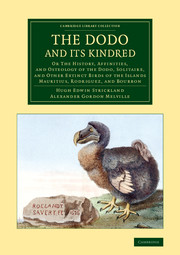
- Publisher:
- Cambridge University Press
- Online publication date:
- June 2015
- Print publication year:
- 2015
- Online ISBN:
- 9781139924405
- Subjects:
- History of Science, Life Sciences, Zoology, General Science
We use cookies to distinguish you from other users and to provide you with a better experience on our websites. Close this message to accept cookies or find out how to manage your cookie settings.

Well versed in natural history, particularly geology and ornithology, Hugh Edwin Strickland (1811–53) became fascinated by the dodo and mankind's influence on its extinction. Seeking to investigate this flightless bird and other extinct species from islands in the Indian Ocean, he invited the comparative anatomist Alexander Gordon Melville (1819–1901) to help him separate myth from reality. Divided into two sections, this 1848 monograph begins with Strickland's evaluation of the evidence, including historical reports as well as paintings and sketches, many of which are reproduced. Melville then analyses the osteology of the dodo and Rodrigues solitaire, describing his findings from dissections of the few available specimens and making comparisons with similar species. A seminal work, it correctly concluded that the dodo was more closely related to pigeons than vultures, and the book also inspired others to take up the search for new fossil evidence.
To save content items to your account, please confirm that you agree to abide by our usage policies. If this is the first time you use this feature, you will be asked to authorise Cambridge Core to connect with your account. Find out more about saving content to .
To save content items to your Kindle, first ensure no-reply@cambridge.org is added to your Approved Personal Document E-mail List under your Personal Document Settings on the Manage Your Content and Devices page of your Amazon account. Then enter the ‘name’ part of your Kindle email address below. Find out more about saving to your Kindle.
Note you can select to save to either the @free.kindle.com or @kindle.com variations. ‘@free.kindle.com’ emails are free but can only be saved to your device when it is connected to wi-fi. ‘@kindle.com’ emails can be delivered even when you are not connected to wi-fi, but note that service fees apply.
Find out more about the Kindle Personal Document Service.
Full text views reflects the number of PDF downloads, PDFs sent to Google Drive, Dropbox and Kindle and HTML full text views for chapters in this book.
 Loading metrics...
Loading metrics...
Book summary views reflect the number of visits to the book and chapter landing pages.
 Loading metrics...
Loading metrics...
* Views captured on Cambridge Core between #date#. This data will be updated every 24 hours.
Usage data cannot currently be displayed.
Accessibility compliance for the PDF of this book is currently unknown and may be updated in the future.